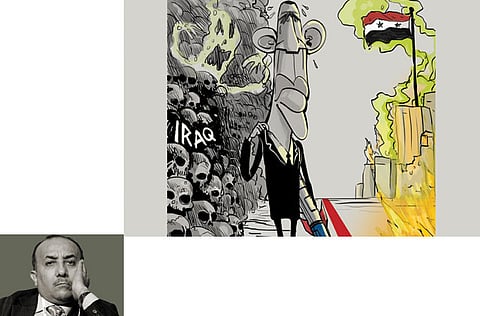Obama’s credibility on the ‘red line’
The real challenge is how to spin Syria to a sceptical public and Congress

It is amazing and sobering how events in the Middle East keep catching the world superpower and its allies off guard. Every time the major powers think they can reduce their footprint in the region and pivot to some other place — Asia, in the case of the US — they get a rude jolt from our perilous and troubled region.
The latest ominous development is courtesy of Bashar Al Assad, who allegedly gassed his own people on August 21, 2013, killing 1,429 innocent, defenceless Syrians (according to the US) and injuring thousands. There was international condemnation and an outcry over this ghastly and wanton act perpetrated by the butcher of Damascus. Shocked western officials, led by the US Secretary of State John Kerry, Secretary of Defence Chuck Hagel and Vice-President Joe Biden, demanded that the act should not go unpunished.
All this while President Barack Obama was busy touring universities and talking about student loans. Obama finally held Al Assad’s regime responsible for the use of chemical weapons. “We have concluded that the Syrian government in fact carried out the attack and if that’s so then there needs to be international consequences.” But the president made it clear by the end of last week that he had not yet made a decision on striking the Syrian regime.
If and when a strike is to take place, it won’t be about regime change but more about degrading his capabilities at best. But is that a strategic move, or is it just to help Obama shore up his credibility and of America after Al Assad dared to cross Obama’s set red line many times without facing any punitive measures.
The irony here is that the president, who was elected to end wars in the Middle East, is now about to start one there. Obama’s credibility is on the line. Although the Iraq hangover still haunts US officials, Syria, as British Prime Minister David Cameron stated to a sceptical House of Commons, is not Iraq.
However, doubts remain about the end game and what would this military strike accomplish. Will it punish Al Assad and redeem Obama’s credibility in the region? But is that a strategic approach or a retaliatory one? If the strike won’t alter the balance of power on the ground and tilt it in favour of the opposition and the Free Syrian Army, it risks, as Senator John McCain said, negative consequences and could be counterproductive.
It would be too little, too late, after the US, the West and the Arabs failed the Syrian people and let Al Assad butcher them. This whole mess is the result of the shameful inaction that we are guilty of.
But this is typical of the US. There is a clear lack of strategy by the US in dealing with the host of crises and problems in the Middle East.
It is confusing for the American public to understand why the US should bomb Al Assad, if it is not about regime change. While at the same time, Obama and other US officials have been saying that Al Assad has to go, but striking him is not about forcing him out? It is really confusing. Former CIA director Michael Hayden was quoted giving an advice to the US policy makers “Go big or go home...”
The real challenge for the US administration is how to spin Syria to a sceptical public and Congress and how not to risk a repeat of another Iraq with unintended consequences. Like strengthening the extremist elements and Al Qaida and Jabhat Al Nusra, which seem to gain from a weakened Al Assad. Or is attacking these extremist elements along with attacking Al Assad’s regime part of the US strategy?
The other challenge is how Syria and the region will look like after the military strike. Will chaos ensue? And what about the retaliatory capabilities of Al Assad and his allies?
The US could go it alone with its destroyers in the eastern Mediterranean and with the might of its Tomahawk missiles targeting Al Assad’s major military bases and command and control centres, inflicting a serious blow to Al Assad and his forces and more importantly to the morale of the regime, its henchmen and its allies.
The ongoing sabre-rattling has no doubt caused panic in Syria and around the region, with the fear of asymmetric retaliation by Al Assad and some other elements, like Iran, who have threatened to target Israel if Syria is attacked. The Israelis are lining up to receive gas masks.
If the strike backfires and does not topple the regime, then Al Assad will boast he stood up to the imperialists and defeated them. Some Republican strategists argue Obama lacks the clarity and confidence to act. The dilemma for Obama is: if he does not respond with authority, America’s foes will interpret it as weakness.
In a region where the US is no longer feared or trusted, what is needed is more than punishing Al Assad for crossing the red line and gassing his own people.
Firing a few missiles to restore Obama’s credibility is not a substitute for sound strategy.
Professor Abdullah Al Shayji is the chairman of the political science department, Kuwait University. You can follow him on Twitter at www.twitter.com/docshayji


